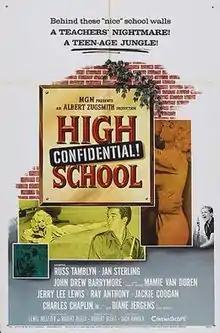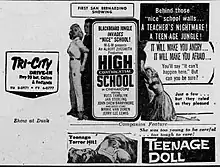| High School Confidential | |
|---|---|
 | |
| Directed by | Jack Arnold |
| Written by | Robert Blees Lewis Meltzer |
| Produced by | Albert Zugsmith |
| Starring | Russ Tamblyn Jan Sterling John Drew Barrymore Mamie Van Doren Jerry Lee Lewis Ray Anthony Jackie Coogan Charles Chaplin Jr. Diane Jergens |
| Cinematography | Harold J. Marzorati |
| Edited by | Ben Lewis |
| Music by | Albert Glasser |
| Distributed by | Metro-Goldwyn-Mayer |
Release date |
|
Running time | 84 minutes |
| Country | United States |
| Language | English |
| Budget | $532,000[1] |
| Box office | $1,915,000[1] |
High School Confidential is a 1958 American crime drama film directed by Jack Arnold, starring Mamie Van Doren, Russ Tamblyn, Jan Sterling, John Drew Barrymore, Jackie Coogan, Diane Jergens and Michael Landon.
The film also features a cameo by Jerry Lee Lewis who opens the movie singing “ “Boppin’ at the High School Hop” which Lewis co-wrote with Ron Hargrave.[2][3] Lewis released the title track as a Sun Records 45 single which became a Top 40 hit, reaching #21 in the Billboard charts.[4][5]
The film is listed in Golden Raspberry Award founder John Wilson's book The Official Razzie Movie Guide as one of The 100 Most Enjoyably Bad Movies Ever Made.[6]
Plot
Mike Wilson, a young police officer, poses as a student under the alias Tony Baker and thus infiltrates a high school in order to investigate a narcotics ring. He lives in an apartment with Gwen Dulaine, a married woman who pretends to be his aunt in public but attempts to seduce him in private.
"Tony" flirts with pupil Joan Staples and incurs the wrath of teacher Arlene Williams as he makes acquaintances in school. He discovers that Joan uses marijuana and inquires about where she purchases it. He ultimately learns that a mysterious man known only as "Mr. A" is the one who sells drugs to the students, helped by an assistant called Bix.
With help from an undercover cop, Quinn, who risks his life to save Mike's, the criminals are apprehended and Joan promises Mike that her drug use is over.
Cast
- Russ Tamblyn as Tony Baker/Mike Wilson
- Jan Sterling as Arlene Williams
- John Drew Barrymore as J. I. Coleridge
- Diane Jergens as Joan Staples
- Mamie Van Doren as Gwen Dulaine
- Jerry Lee Lewis as Himself
- Ray Anthony as Bix
- Jackie Coogan as Mr. 'Mr. A' August
- Charles Chaplin Jr. as Quinn
- Michael Landon as Steve Bentley
- Lyle Talbot as William Remington Kane
- Robin Raymond as Kitty
- Burt Douglas as Jukey Judlow
Veteran character actor Charles Halton appears uncredited in his last role as Mr. Robinson, the high school principal.
Production

It was produced by Albert Zugsmith, the first of a six-picture deal he had signed with MGM. MGM would get 75% of the profits, Zugmsith 25%.[7][8]
In January 1958 Russ Tamblyn, who had just made the movie Tom Thumb (1958), was assigned to star.[7] Filming started February 1958.[9] Filming started February 1958.
George Raft was meant to play a role but in March MGM announced Jackie Coogan would be playing the part instead. No explanation was given.[10]
The film was based on an original script by Lewis Meltzer and screen story by Robert Blees. and according to critic Dana M. Reemes “utterly preposterous from beginning to end.”[11]
High School Confidential! was conceived by Zugsmith, Meltzer and Blees and as a teenage exploitation film with an anti-marijuana message.[12] Director Jack Arnold recalls an exchanges with producer Zugsmith regarding the film’s style and theme:
Zugsmith wanted an out-and-out exploitation picture, a straight, preachy, [anti-drug] message film—and if I could put nudity into it that would be great! I got along very well with Zugsmith. I just didn’t agree with him on everything, but he didn’t insist, which was a pleasure. If he didn’t like what I did I would just say, “Well, I like it,” and he’d leave me alone.[13]
Box office
According to MGM records the film earned $1,290,000 in the US and Canada[14] and $625,000 elsewhere, resulting in a profit of $578,000. However, the follow-up films Zugsmith made for the studio, including The Beat Generation and Platinum High School, lost money.[1]
In popular culture
“High School Confidential! is deliberately and stylishly ludicrous, lampooning the anti-marijuana ideologies while glamorizing the erstwhile dopers. This latter aspect did not escape the federal narcotics people who sensed that the film was a dope, rock-and-roll, sex, and fast-car escapist fantasy for teens.—Biographer Dana M. Reemes in Directed by Jack Arnold (1988)[15]
This film is sampled on White Zombie's album La Sexorcisto: Devil Music, Vol. 1 on four separate occasions: the "Do you want to start a rumble?" conversation, the "Drop it, buster!" line, the "tomorrow's a drag" poem, and the Columbus speech ("the only thing square about this world...").
In the 1980 song "High School Confidential" by the Canadian new wave band Rough Trade (album: Avoid Freud), singer Carole Pope refers to the star of this film, Mamie Van Doren.
See also
References
- 1 2 3 The Eddie Mannix Ledger, Los Angeles: Margaret Herrick Library, Center for Motion Picture Study.
- ↑ Crouse, Richard (2003-09-01). The 100 Best Movies You've Never Seen. ECW Press. p. 115. ISBN 1-550-22590-1.
- ↑ Denisoff, R. Serge; Romanowski, William D. (1990). Risky Business: Rock in Film. Transaction Publishers. p. 96. ISBN 0-887-38843-4.
- ↑ Havers, Richard; Evans, Richard (2010-04-01). The Golden Age of Rock 'N' Roll. Book Sales Inc. p. 76. ISBN 978-0-785-82625-5.
- ↑ Reemes, 1988 p. 233: Notes section, footnote no. 5: “released by Sun Records as part of a tie-in with the film.”
- ↑ Wilson, John (2005). The Official Razzie Movie Guide: Enjoying the Best of Hollywood's Worst. Grand Central Publishing. ISBN 0-446-69334-0.
- ↑ Universal Pictures, Trying to Erase Loss, Joins in Switch to Independent Producers By STANLEY W. PENN Staff Reporter of THE WALL STREET JOURNAL. W10 July 1958: 7.
- ↑ Reemes, 1988 p. 110: See here for brief background on Zugsmith’s departure from Universal-International and contract with MGM
- ↑ JULIE LONDON CAST WITH GARY COOPER New York Times 16 Jan 1958: 32.
- ↑ ROLE AS CO-STAR FOR MEL FERRER . New York Times 5 Mar 1958: 36.
- ↑ Reemes, 1988 p. 216-217: In Filmography section. And p. 115: “...utterly preposterous…”
- ↑ Reemes, 1988 p. 112: Zugsmith’s “choice of subject, his casting Mamie Van Doren, and the exploitation campaign…”
- ↑ Reemes, 1988 p. 112
- ↑ "Top Grossers of 1958". Variety. 7 January 1959. p. 48. Please note figures are for US and Canada only and are domestic rentals accruing to distributors as opposed to theatre gross
- ↑ Reemes, 1988 p. 117